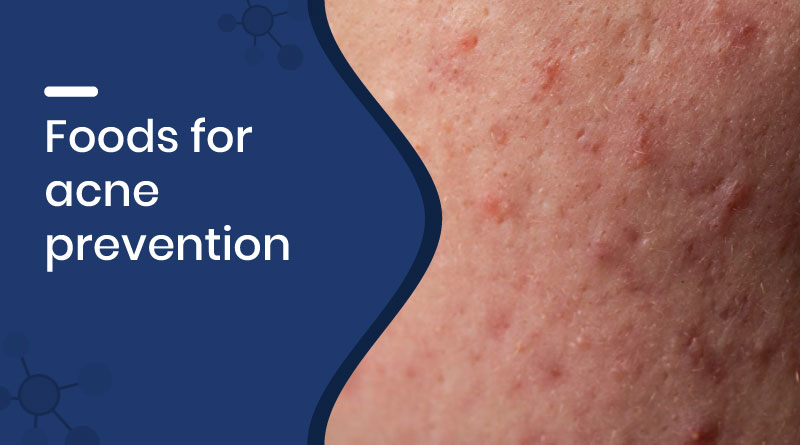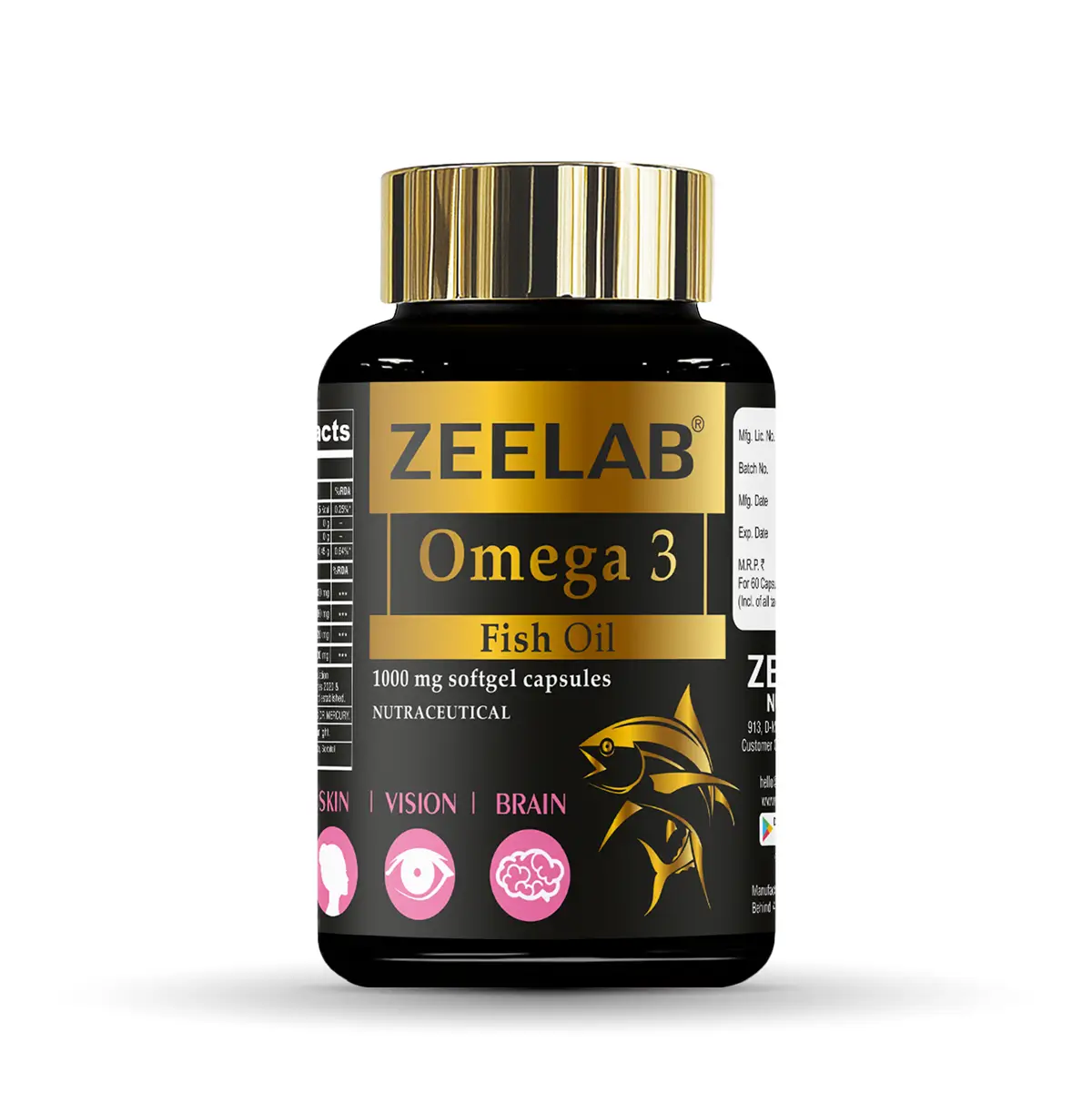Best Foods for Acne Prevention


Acne is a common skin problem that can occur at any stage of life. While skincare plays a role, what you eat can significantly impact your skin's health. Certain nutrients help reduce inflammation and regulate hormones, the key factors in acne prevention. In this blog, we’ll explore the role of diet in acne prevention and the best foods to include and avoid.
What Causes Acne?
Acne starts when pores get filled with oil and dead skin cells. Factors such as hormonal imbalances, high-glycemic diets, stress, poor hygiene, and certain medications can contribute to breakouts. A diet high in processed foods and sugar is one of the most overlooked yet powerful acne triggers.
Which Foods Can Help in Acne Prevention?
1. Zinc-Rich Foods
Zinc has anti-inflammatory and antibacterial properties. It helps reduce sebum production and supports skin healing.
- Pumpkin seeds
- Chickpeas
- Cashews
- Lentils
- Quinoa
- Oysters
Also read - Zinc Supplement for Women
2. Omega-3 Fatty Acids
Omega-3s are powerful anti-inflammatories that regulate hormones and soothe the skin.
- Flaxseeds
- Chia seeds
- Walnuts
- Fatty fish like salmon, mackerel, and sardines
3. Vitamin A
Vitamin A helps prevent the overproduction of keratin and sebum, which can clog pores and lead to acne.
- Sweet potatoes
- Carrots
- Spinach
- Kale
- Mangoes
Also read - Vitamin A for Skin Health
4. Vitamin E
This antioxidant protects skin from oxidative stress, which can aggravate acne.
- Almonds
- Sunflower seeds
- Avocados
- Spinach
5. Probiotics
A healthy gut is linked to clearer skin. Probiotics help maintain a balance of good bacteria, which can reduce inflammation and acne flare-ups.
- Yogurt
- Kefir
- Fermented foods like kimchi, sauerkraut, and miso
6. Low-Glycemic Foods
Foods with a low glycemic index don’t spike blood sugar levels, which helps prevent hormonal changes linked to acne.
- Whole grains
- Legumes
- Green vegetables
- Most fruits
Which Foods to Avoid for Clearer Skin?
1. Sugar and Refined Carbs
Spikes in insulin from sugar can increase oil production and worsen acne.
- White bread
- Pastries
- Candies
- Soft drinks
2. Dairy Products
Dairy can stimulate hormones like IGF-1, which may aggravate breakouts.
- Almond milk
- Oat milk
- Coconut milk
3. Fast Foods
These increase inflammation and oil production.
- French fries
- Burgers
- Pizza
- Chips
4. Excessive Caffeine
Too much caffeine can elevate cortisol (stress hormone), worsening acne.
- Energy drinks
- Excessive coffee
- High-caffeine teas
Role of Hydration in Acne Management
Drinking enough water is one of the simplest yet most overlooked ways to support clear skin. Proper hydration helps flush out toxins, regulate oil production, and keep your skin plump and healthy. Dry, dehydrated skin often triggers excess oil production, which can block pores and cause breakouts. Aim for 8–10 glasses of water daily and include water-rich foods like cucumbers, oranges, and watermelon in your diet.
Effective Home Remedies for Acne
- Honey and Cinnamon Mask: Combine honey with cinnamon to make a mask that helps fight acne-causing bacteria.
- Aloe Vera Gel: Apply fresh aloe vera to soothe and heal irritated skin.
- Tea Tree Oil: Dab diluted tea tree oil on pimples to reduce bacteria.
- Green Tea Toner: Use cooled green tea as a natural antioxidant toner.
- Apple Cider Vinegar: Dilute with water and apply to balance skin pH (do a patch test first).
- Ice Cubes: Rub gently on inflamed areas to reduce redness and swelling.
Skincare & Lifestyle Tips for Acne Prevention
- Drink at least 8 glasses of water daily
- Wash your face twice a day using a gentle cleanser
- Avoid touching your face or popping pimples
- Manage stress with yoga or meditation
- Get 7–8 hours of quality sleep every night
- Change pillowcases regularly
Also read - Best Cream for Acne Treatment in India
Conclusion
Preventing acne isn’t just about what you apply to your skin; it’s also about what you eat. A diet rich in anti-inflammatory, antioxidant, and hormone-regulating nutrients can help you achieve clearer, healthier skin. Make simple swaps, avoid common triggers, and nourish your skin from the inside out.
Also Read: Best Antibiotics for Acne
Frequently Asked Questions (FAQs)
Q. Can diet alone help in acne removal?
A. A proper diet can help manage acne by lowering oiliness, calming inflammation, and supporting skin repair through essential nutrients.
Q. Are chocolate and greasy food bad for acne?
A. Greasy foods may contribute to inflammation, but dark chocolate, in moderation, is usually fine.
Q. Can drinking more water help reduce acne?
A. Yes, drinking plenty of water helps flush out toxins and keeps your skin hydrated, which may support acne healing and reduce future breakouts.
Q. Does wearing makeup lead to more acne breakouts?
A. Some makeup products can clog pores, especially if they’re heavy or not removed properly. Choose oil-free, non-comedogenic products and never skip makeup removal before bed.
Q. Does eating oily or fried food cause acne?
A. Oily foods don’t directly cause acne, but diets high in unhealthy fats and processed items may trigger it.
Vitamin E (400mg)
10 capsules In 1 strip
Omega 3 Fatty Acid (1000mg)
60 Softgel Capsules
Recent Blogs
Disclaimer : Zeelab Pharmacy provides health information for knowledge only. Do not self-medicate. Always consult a qualified doctor before starting, stopping, or changing any medicine or treatment.


















 Added!
Added!